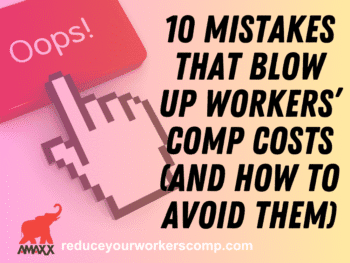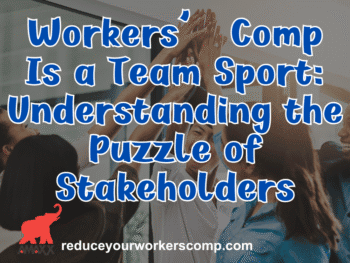Myths and Realities: Elephant Bites
Myth: Employees stay out of work intentionally because they don't want to go back to work.
REALITY: Employees often don't come back to work because a company won't offer them a transitional duty assignment while they recuperate. While some employees try to stay out of work, that's not always the case. In some situations, where an employer has only a few, narrow job classifications in their operation, there aren't many transitional duty options; in these situations the employer must "think outside the box" to locate jobs not obvious at first glance. Employees are motivated to come back to work because they have friends in the workforce, they need a steady daily routine, and they don't want to become deconditioned while not working. In many cases, employees become depressed with the loss of their routine. Employees need a destination to go to each day!
Myth: Once implemented your workers' compensation premiums will immediately go down.
REALITY: The loss costs (as distinguished from the premium) will fall immediately, but the premiums take several years to fall because they are calculated based on a company's experience modification, usually a 3-year rolling average. As one good year "rolls" into your experience, a bad year drops out so it takes three years for the full benefit of a workers' compensation cost containment program to be reflected in your premiums.
Myth: High workers' compensation costs are caused by aggressive plaintiff's attorneys and laws favoring employees. REALITY: There are many things a company CAN DO, which are within their control, to reduce their costs. These gaps cost companies millions of dollars each year by failing to use the tools already available to them. 1. Inaction and lack of planning, poor communication with the employee, adjuster and medical providers are major gaps driving the cost of workers' compensation higher. 2. Poor workplace morale and failure to take advantage of existing opportunities are other gaps in company processes which drive costs higher. For example, if you operate in a state where employees are allowed to go to the physician of their choice, you can "coach" them to a physician who advocates transitional duty. Some will use the doctor you suggest. If the employee's doctor has visited your operation to see the jobs the employees perform, it can be helpful to build a solid relationship between the company and the treating doctor. So, while it is somwhat true aggressive plaintiffs' lawyers prolong an employees time out of work, thus making the cost of the claim higher, and laws \ viewed as claimant-oriented can drive the cost of a claim higher, it only part of the story.
Myth: Workers' compensation cost containment programs are a "quick fix" to the high costs of workers' compensation. REALITY: An effective workers' compensation cost containment program is a systematic and thorough approach to cost reduction – not a "quick fix." It focuses on multiple areas all tied together with an effective communication strategy. The design and development of a workers' compensation cost containment program can be done within a few months if there are dedicated resources making design and implementation a priority.
Author: Rebecca Shafer, J.D. consults for mid-market and national accounts focusing on project management, risk management assessments, data review, benchmarking, and development of Workers' Compensation and Injury Management Programs. Projects focus on development of training and education programs, document design, evaluation and integration of insurance claims administration and TPA services. Contact her are: RShafer@ReduceYourWorkersComp.com We are accepting short articles* (200-600 words) on WC cost containment. Contact us at: Info@WorkersCompKit.com. *Non-compensable.
WC IQ Test: http://www.workerscompkit.com/intro/ WC Books: http://www.reduceyourworkerscomp.com/workers-comp-books-manuals.php NEW Article: Return to Work in Unionized Companies http://reduceyourworkerscomp.com//Return-to-Work-Programs-Unionized-Companies.php
Do not use this information without independent verification. All state laws vary. You should consult with your insurance broker about workers' comp issues. ©2008 Amaxx Risk Solutions, Inc. All rights reserved under International Copyright Law. If you would like permission to reprint this material, contact Info@WorkersCompKit.com
























